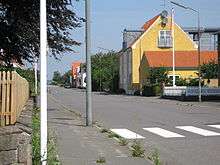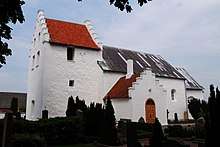Pedersker
Pedersker is a little village in the southeast of the Danish island of Bornholm, 8 kilometres (5.0 mi) southeast of Aakirkeby and 11 kilometres (6.8 mi) southwest of Nexø. As of 2020, it has 241 inhabitants.[1]

Description
Pedersker is a quiet Danish village surrounded by farmed fields. To the north, beyond the former railway, the Lynggårdsskoven woods are managed by the State. The populated area is mainly in a triangular section between the main road and the railway, some 64% of the houses dating to before 1950. To the south of the village, the little fishing village of Bakkerne Havn has become an important summer house development. There is a private school in the village and the old dairy is considered to be of importance to the local heritage.[2] The old railway station at 51 Pedersker Hovedgade served the Rønne–Nexø railway which ran from 1900 to 1968.[3] Not far from the church to the west of the village (at 208 M Søndre Landevej), there is a Dutch windmill, Kirkemøllen, built in 1861. It was renovated and repainted in 2010.[4]
St Peter's Church

The village gets its name from St Peter's Church as Peders ker simply means "Peter's church" in Bornholm dialect.[5] Built in the Romanesque style, the church is thought to be the oldest on Bornholm, dating from the 10th or the 11th century.[6]
Rispebjerg
The archeological site of Rispebjerg is located some 3 kilometres (1.9 mi) east of the village. Open to visitors, it contains the remains of a Neolithic sun temple as well as Iron Age earthworks.[7]
References
- BY3: Population 1 January, by urban areas The Mobile Statbank from Statistics Denmark
- "305 - Pedersker" Archived 2013-07-02 at the Wayback Machine, Bornholms Regionskommune. (in Danish) Retrieved 2 November 2012.
- Ann Vibeke Knudsen: DBJ – Historien om Jernbanerne på Bornholm. Bornholms Museum 2007.
- "Pedersker Kirkemølle". (in Danish) Retrieved 2 November 2012.
- H.A. Koefoed, "Gøbbanissa – og andre sære bornholmske ord og stednavne", Bornholms Tidendes Forlag, 1997, ISBN 87-7799-058-7 (in Danish)
- "Peders Kirke", Den Store Danske. (in Danish) Retrieved 21 September 2012. The oldest part is the chancel which probably first stood alone.
- "Rispebjerg" Archived 2012-10-23 at the Wayback Machine, Naturstyrelsen. (in Danish) Retrieved 2 November 2012.
